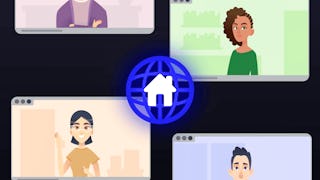The dynamics of remote work present unique challenges and opportunities for leaders. This course offers remote leaders a comprehensive guide to harnessing the benefits and minimizing the drawbacks of remote work to foster greater collaboration and trust across their teams. Over four engaging modules, learners will explore effective leadership styles for remote environments, strategies to mitigate the silo mentality and communication breakdowns, methods to recognize and address isolation and burnout, and techniques for constructively managing remote conflicts. By the end of this course, learners will have the skills to foster open team communication, build trust, conduct difficult conversations, and transform negative conflicts into opportunities for growth.



Leadership in Remote Work
This course is part of Remote Leadership for Managers Specialization

Instructor: Patty Malone
Included with 
Recommended experience
Recommended experience
What you'll learn
Recognize the impact of the silo mentality on remote team communication and strategies to improve information sharing and collaboration across teams.
Define various leadership styles and adapt them effectively to a remote work setting
Identify how to overcome burnout and other remote work challenges, apply methods to promote employee well-being, and manage conflicts constructively.
Skills you'll gain
Details to know

Add to your LinkedIn profile
4 assignments
See how employees at top companies are mastering in-demand skills

Build your subject-matter expertise
- Learn new concepts from industry experts
- Gain a foundational understanding of a subject or tool
- Develop job-relevant skills with hands-on projects
- Earn a shareable career certificate


Earn a career certificate
Add this credential to your LinkedIn profile, resume, or CV
Share it on social media and in your performance review

There are 4 modules in this course
Welcome to Module 1, Dynamics of Remote Work. This module focuses on the silo mentality and the challenges it brings to effective communication in remote teams. We will explore best practices to prevent the silo mentality, how to build bridges of communication across teams and strategies for mitigating communication breakdowns in the virtual environment. We will also reflect on our own experiences in siloed work environments and weigh the effectiveness of different remote communication strategies in real-world situations.
What's included
1 video2 readings1 assignment1 discussion prompt
Welcome to Module 2, Leadership Styles in a Virtual Environment. This module explores the six main leadership styles and how to adapt them to a remote work environment. We will also cover ways to build trust, avoid miscommunication, and give positive and negative feedback to remote team members. We will close the module with a discussion of our own leadership styles, their differences when face-to-face versus online, and strategies to bring out our best leadership qualities.
What's included
1 video1 reading1 assignment1 discussion prompt
Welcome to Module 3, Handling Remote Challenges. In this module, we will discover how to handle isolation and burnout in virtual team members, conduct difficult conversations remotely, approach common distractions, and address uncertainty in team member’s roles and expectations. We will then discuss the unique demands of virtual work that can exacerbate burnout and strategies to overcome it.
What's included
1 video1 reading1 assignment1 discussion prompt
Welcome to Module 4, Conflict in Virtual Environments. This module explores the different types of conflicts, their common causes in virtual teams, and the most common conflict management styles. We will also discover the dos and don’ts of conflict resolution, the positive outcomes of resolving conflict well, and how to prevent negative conflict. We will close the module by discussing what types of conflict we’ve experienced in virtual environments and how it was or could have been handled well.
What's included
1 video2 readings1 assignment1 discussion prompt
Instructor

Offered by
Explore more from Leadership and Management


University of California, Irvine


University of California, Irvine


University of California, Irvine
Why people choose Coursera for their career




New to Leadership and Management? Start here.

Open new doors with Coursera Plus
Unlimited access to 10,000+ world-class courses, hands-on projects, and job-ready certificate programs - all included in your subscription
Advance your career with an online degree
Earn a degree from world-class universities - 100% online
Join over 3,400 global companies that choose Coursera for Business
Upskill your employees to excel in the digital economy
Frequently asked questions
Access to lectures and assignments depends on your type of enrollment. If you take a course in audit mode, you will be able to see most course materials for free. To access graded assignments and to earn a Certificate, you will need to purchase the Certificate experience, during or after your audit. If you don't see the audit option:
The course may not offer an audit option. You can try a Free Trial instead, or apply for Financial Aid.
The course may offer 'Full Course, No Certificate' instead. This option lets you see all course materials, submit required assessments, and get a final grade. This also means that you will not be able to purchase a Certificate experience.
When you enroll in the course, you get access to all of the courses in the Specialization, and you earn a certificate when you complete the work. Your electronic Certificate will be added to your Accomplishments page - from there, you can print your Certificate or add it to your LinkedIn profile. If you only want to read and view the course content, you can audit the course for free.
If you subscribed, you get a 7-day free trial during which you can cancel at no penalty. After that, we don’t give refunds, but you can cancel your subscription at any time. See our full refund policy.
More questions
Financial aid available,



